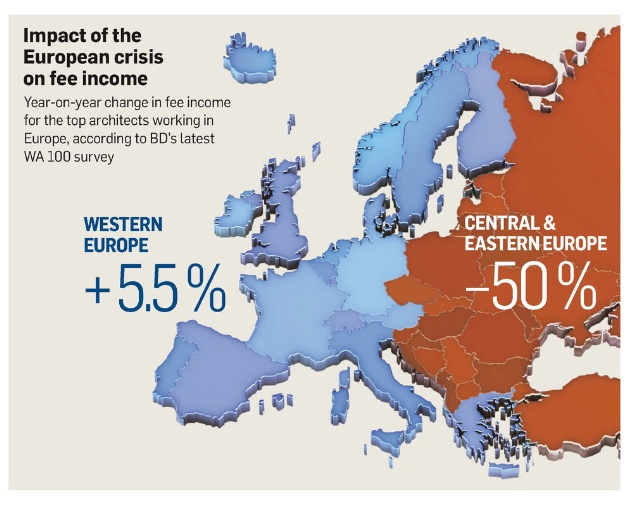European crisis hits architects’ profits
|
The crisis gripping Europe has hit architects’ profits, with top practices’ fees suffering a 50% drop in central and eastern Europe this year. Western Europe showed a modest increase of 5.5% but architects’ outlook for the region remains particularly gloomy. Nearly three-quarters of practices polled for the latest World Architecture 100 survey say they expect the market in western Europe to decline or stagnate in 2012. In an illustration of the hammering western Europe has taken, the firm that consistently tops the region’s earning charts — BDP — took £13 million less this year than it did in 2010. Eight of the top 10 practices in the region recorded declines this year. Broadway Malyan’s earnings were down £5 million and Sheppard Robson’s were down £4.2 million. Foster & Partners dropped £1.3 million with a spokeswoman describing Europe as “pretty flat”.
Many practices admit they are looking further afield, though there is still work to be won on the continent. Adrian Griffiths, a director at Chapman Taylor, said its fees from Europe and the UK rose by a fifth in the last year, thanks in part to the strength of the Russian market. But the firm’s Madrid office is augmenting its order book with work from Turkey, while Paris is designing hotels in Morocco, he said. Gary Whittle, managing director of Broadway Malyan, said long-established Iberian clients were leading them to projects in their former colonies such as Brazil and Mozambique. Many practices reported mixed-use retail schemes were holding up well, and the countries inspiring most confidence were Poland, Germany and Norway. Polish retail specialist David Collins, chairman of ESA which has just been bought by Capita Symonds, said: “Other sectors have been hit quite hard. Offices outside key areas have dried up a lot, as has high-density housing. Up until the crisis all those Rob Firth of HOK, which last year earned $37 million from Europe, said there were “massive issues” of uncertainty. “I am off to Milan to look at an enormous project this week but you have to wonder whether Italy will be looking to scrap projects sponsored by Berlusconi,” he said. He added that PFI was likely to become increasingly popular in Europe and this could actually work to the advantage of British practices which were generally larger and more experienced in this field.
|




